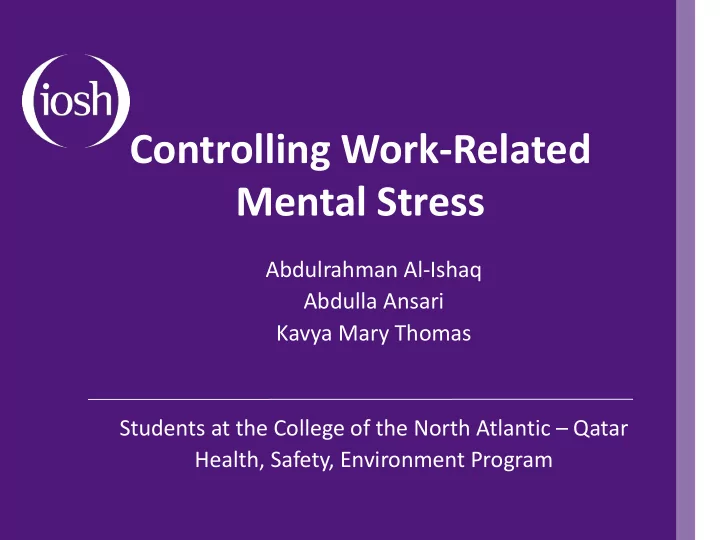

Controlling Work-Related Mental Stress Abdulrahman Al-Ishaq Abdulla Ansari Kavya Mary Thomas Students at the College of the North Atlantic – Qatar Health, Safety, Environment Program
Introduction By the end of this presentation, you will be able to: – Identify the signs and symptoms of – Explain the physiological response to; and – Outline the key preventative measures for work-related mental stress.
Signs and Symptoms Physical Cognitive Emotional Behavioural • • • • Low energy Constant Easily agitated Change of • • Headaches worrying Feeling appetite • • • Upset stomach Racing overwhelmed Procrastination • • • Nausea thoughts Difficulty Avoiding • • Insomnia Forgetfulness & relaxing responsibilities • • • Aches & pains disorganization Low self- Exhibiting • • Tense muscles Inability to esteem nervous • • Chest pain focus Loneliness & behavior • • • Rapid heart Poor judgment depression Increased use • • beat Pessimistic Avoiding co- of alcohol • Frequent colds and/or workers and/or and infections negative cigarettes • Stress fractures
Psychological Signs and Symptoms • Additional resource
Physiological Response – HPA Axis
Physiological Response – Cortisol
Physiological Response – Systems
Key Preventative Measures • Access to counseling is an effective strategy for companies to help employees manage mental stress • Exercise and recreational activities are proven to be effective ways to reduce mental stress
Key Preventative Measures • Train supervisors to recognize the signs and symptoms of work-related mental stress • Educate employees about the hazards and controls of work-related mental stress
Key Preventative Measures • Additional resource
Conclusion • Work-related mental stress triggers physiological responses that alter physical, emotional, behavioural and cognitive performance • Learn to recognize the early signs and symptoms of work-related mental stress • Counseling, physical activity, and training are effective preventative measures for work-related mental stress • Additional resources can further direct you to reduce the consequences of work-related mental stress in your organization
Recommend
More recommend